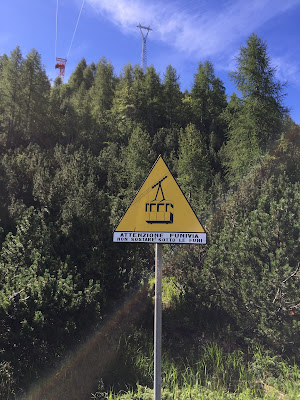previous lesson | this lesson | next lesson
Left: A bottle of grappa called Pòta! at Rifugio Cassinelli. Right: Street sign using Pòta.


Pòta! – Hell!
The translation of the catch all Bergamasco word pòta (as an interjection) as "hell" sort of catches the spirit of the word, but it is much more. The dictionary Vocabolario Bergamasco-Italiano published in 1859 (page 389) defines it as equivalent to the Italian caspita! or diamine! The wikitionary page for pota describes it thoroughly with its different uses as a pause word, an exclamation, a way to express powerlessness, sarcasm, or disapproval.
Here, pota is used in a sign indicating a street under repair in Piazza Pontida, and for the name of a grappa brand. The sign in Piazza Pontida is roughly equivalent to the Italian scusateci per il disagio, ma stiamo lavorando per voi or excuse us for the inconvenience but we are working for you.
Pota, the noun, refers to the female genitalia. I guess the exclamation point is kind of important to know what sense you are using the word?
Left: Stickers to peel off and stick on sale at a newsstand in Bergamo. Right: A polish nun at a newsstand in Bergamo.


Stacca e attacca – Peel and stick
Stacca is the second person singular imperative of the verb staccare – to detach, and attacca is the second person singular of the verb attaccare – to attach. The phrase is used to refer to stickers for kids that you can buy at a newsstand.
Related newsstand story: Recently, a Polish nun (polacca) was in front of us at the newsstand near Porto S. Alessandro in Città Alta. She seemed lost and the woman behind the counter was frustrated with what the nun was trying to ask. We stepped in to help, or so we thought. She spoke only Polish and we spoke English and Italian, so we waved our arms and tried to communicate at first. After 10 minutes of going nowhere, we got the bright idea to use our phones to translate. That helped a bit. After another 10 minutes, we learned that the Polish sister was not at all lost, she knew exactly where she wanted to go and she, in fact, seemed frustrated that we were so clueless. And so off she went to the funicular for San Vigilio. In the end, it seemed she had stopped at the newsstand to ask the way to S. Vigilio by trying to point at the S Vigilio castle on a postcard. Alas, the woman running the newsstand thought the nun wanted to buy the postcard. All this to get to my silly alliteration: stacca e attacca, va via la polacca!
A sign warning not to cut below the wire without first talking to the owner.

Attenzione: per il taglio delle piante soto la linea rivolgersi al proprietario – Warning: before cutting the vegetation below the line, check with the owner
We saw this sign on a hike from Nembro to Bergamo. You often see the verb rivolgersi in signs with the sense of to check with or go to someone. Instead of using an imperative form of the verb rivolgiti (you informal), si rivolga (you formal), rivolgetevi (you plural), the infinitive form of the verb is used as is often it is in official settings or instructions. For example, you will see the infinitive imperative form when using an ATM.
Beach chair for rent.

Noleggio sdraio 2€, rivolgersi al bar – Beach chair rentals 2 euros, inquire at the bar
We have our rivolgersi again, but this time it’s to ask about renting a beach chair or sdraio. Sdraiare is to lay down. We saw this notice at the Rifugio Cassinelli on a hike below Pizzo della Presolana. While not on a beach, you might want the chair to spend some time gazing down from the rifugio.
Don't stop under the funivia sign.

Attenzione funivia, non sostare sotto le funi – Warning, cable car overhead, do not stop below the cables
On a recent hike (Carona to Rifugio Laghi Gemelli), I was struck by the word funi on this sign having never seen it before. Funi is the plural of fune – cable. After a little thought, the word funivia started to make some sense in that it's composed of fune(i) and via – route or way so that funivia is a route on cables.
If the stream rises suddenly, get moving, and don't stop under the funivia either.

Attenzione pericolo, possibilità di onde di piena improvise anche per manovre su opera idrauliche – Danger, possibility of sudden flood also because of maneuvers of the hydraulic operations
On the same hike (Carona to Rifugio Laghi Gemelli), we saw this odd sign As if a sudden wave of water occurring naturally isn’t enough to worry about (such as from a sudden downpour?), this sign suggests that operation of the hydraulic works in the area may also cause a sudden wave of water in the stream.
The sign was just below Lago Gemelli. As explained in La Montagna che Produce - Centrali idroelettriche Valle Brembana (Italian only), the development of the lakes in this area started in the early 20th century as a way to control capacity of the Brembo River and maximize energy production. The linked article suggests that there could be diurnal variations to keep downstream operations supplied with water.
Who doesn't need clips?


Mollette milleusi – All-purpose clips
Mollette is the plural of molletta, which is the diminutive of molla – spring. Milleusi is 1,000 (mille) uses (usi), multi-use or all-purpose.
Harry Potter latest pre-order.

Se prenoti subito la tua copia, con Altafedeltà avrai 15% di sconto. Il libro uscirà il 24 settembre – If you reserve your copy now using the Altafedeltà card, you will get a 15% discount. The book will be released on September 24th
The latest Harry Potter story, Harry Potter and the Cursed Child, translates as Harry Potter e la maledizione dell’erede. In this sign for IBS+Libraccio, you can reserve a copy (prenotare) of the book that will be released (uscire) on September 24th, later than the English version release date.
No comments:
Post a Comment
All comments are moderated. If your comment doesn't appear right away, it was likely accepted. Check back in a day if you asked a question.